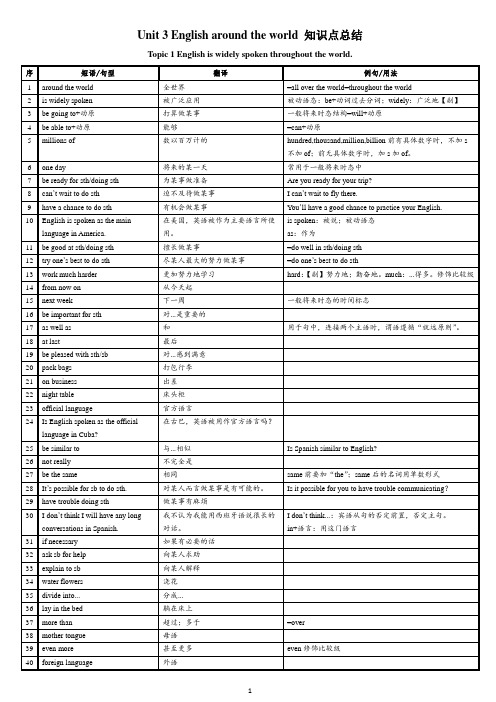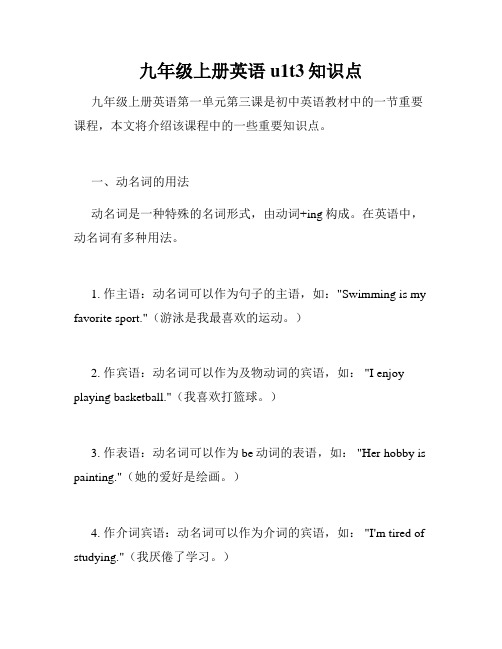九年级U3 T1 知识点总结
九年级上册PPT总复习U3T1

• 许多人说英语。
• 3 one day既可用来表示“将来有一天”,也可表示“过 去曾经有一天”。
• e.g. One day, he met an old friend.一天, • 他遇见了一位老朋友。
• I am going to Tibet one day. • 将来有一天我要去西藏。 • some day 只表示“将来有一天”。
1.Many people use computers. Computers __a_re__ __u_s_e_d___ by _m__a_n_y__ p_e_o_p_l_e____.
2.The workers plant trees in the garden. Trees _a_r_e__ _p_l_a_n_te_d_ in the garden _b_y__ the workers.
He speaks EEnngglilsishh..
English is spoken by him. SShhee speaks CChhinineessee.
Chinese is spoken by her.
主动语态: 主语
+
动词
+
宾语
被动语态: 3; 宾语
2a Study the example and find out how to change the active voice into the passive voice. Then complete the sentences.
• 他有很好的机会去参观北京大学。 • 6 throughout prep. 遍及;贯穿。
• throughout the world • 全世界,与all over the world, around the world
Unit 3 Topic 1 知识清单 仁爱版九年级上册

Unit 3English Around the World Topic 1English is widely spoken throughout the world.Section AⅠ.核心单词1.根据音标写出以下单词及其中文意思。
音标单词中文意思/kɑː(r)ˈtuːn/cartoon 漫画2.根据下列单词写出其中文意思。
character人物;角色;(汉)字;字体;品格widely普通地;广泛地throughout 遍及;贯穿 foreigner 外国人film-maker电影制作人garage 停车房;车库Ⅱ.翻译下列短语1.从今往后;从现在开始from now on2.对……感到高兴;满意于……be pleased with3.坚持做某事stick to doing sth.4.迫不及待做某事can’t wait to do sth.5.有机会做某事have a chance to do sth.6.遍及全世界throughout/ all over/ around the world7.将要能做某事will be able to do sth.8.数以百万的millions ofⅢ.将以下句子翻译为英文,注意括号内要求1.世界上有许多人讲英语。
(使用被动语态)English is spoken by many people in the world.2.他每天坚持在操场上跑步。
He sticks to running on the playground every day. 3.尽你最大的努力,从现在开始更努力地学习。
Try your best and study (much) harder from now on.4.不用担心。
Don’t worry. / Don’t be worried.5.我迫不及待想要去北京。
I can’t wait to go to Beijing.6.你可以把它贴在墙上。
初中英语 仁爱版九年级上册Unit3 Topic1知识点

Unit3 Topic1Section A1.You can stick it on the wall.你可以把它粘在墙上。
(1)stick(动词)粘贴,粘住Eg:Please stick this map of China on the wall.请把这张中国地图粘在墙上。
(2)stick(名词)木棒,木棍,枝条walking stick拐杖(3)stick to sth.坚持,坚守(某种观点、主张、理想、真理、协议)Eg:He always sticks to his own decision.他总是坚持他自己的决定。
(4)stick to doing sth.坚持做某事Eg:He sticks to speaking English every day.他坚持每天说英语。
2.Guess what!猜猜看!3.character人物,字体,性格特征4.Disneyland is enjoyed by millions of people from all over the world.世界上数百万的人都喜欢迪士尼乐园。
(1)is enjoyed被喜欢,是一般现在时的被动语态结构。
(2)by被(由)...,放在句子的后面,特别强调动作或行为的执行者。
5.I hope I can go there one day.我希望有朝一日能去那儿。
one day表示过去或将来的某一天,意为“(过去)有一天,(将来)有朝一日”。
Eg:One day you will understand.总有一天你会明白的。
One day a little monkey was playing by the river.有一天,一只小猴子在河边玩耍。
some day一般只表示将来的某一天,即“有朝一日,总有一天”。
Eg:Some day he will be famous.总有一天他会成名的。
6.Are you ready for your trip?你为旅行准备好了吗?(1)be ready for sth.为某事准备好Eg:The famous singer is ready for the concert.这个著名的歌手已经准备好演唱会。
九年级仁爱版英语u1u3知识点

九年级仁爱版英语u1u3知识点九年级仁爱版英语U1-U3知识点第一章基本短语与句型知识点一:问候与介绍在学习英语的过程中,我们需要学习一些基本的问候和介绍的用语,这对于建立良好的人际关系非常重要。
1. 问候用语:- Good morning/afternoon/evening. 早上/下午/晚上好。
- How are you? 你好吗?- How’s it going? 近况如何?- How’s everything? 一切如何?- What’s up? 有什么新鲜事吗?2. 介绍用语:- Let me introduce myself. 让我自我介绍一下。
- This is… 这是…- Nice to meet you. 很高兴见到你。
- How do you do? 你好。
知识点二:家庭关系家庭是每个人成长的温暖港湾,了解家庭关系对于描述自己和别人的生活背景和经历非常重要。
1. 家庭成员:- father 父亲- mother 母亲- parents 父母- brother 兄弟- sister 姐妹- grandparents 祖父母- uncle 叔叔- aunt 阿姨- cousin 堂兄弟姐妹/表兄弟姐妹2. 家庭成分:- family 家庭- home 家- house 房子- room 房间- living room 客厅- kitchen 厨房- bedroom 卧室- bathroom 浴室- garden 花园3. 问家庭成员:- How many people are there in your family? 你家有几口人?- Do you have any siblings? 你有兄弟姐妹吗?知识点三:日常活动日常活动是我们生活的主要组成部分,掌握相关的动词和短语能够更好地描述自己和别人的生活。
1. 动词:- eat 吃- drink 喝- sleep 睡觉- study 学习- work 工作- play 玩- watch 观看- read 读- listen to 听- go 去- come 来- do 做2. 日常活动短语:- have breakfast/lunch/dinner 吃早餐/午餐/晚餐- go to school/work 去学校/上班- do homework 做作业- watch TV/ a movie/ a show 看电视/电影/演出- play basketball/ soccer/ chess 打篮球/足球/下棋- read a book/magazine 报纸/杂志第二章语法与句型知识点四:一般现在时一般现在时是最基础也是最常用的时态之一,表示当前的状态、经常性的动作或者客观事实。
仁爱英语九年级 U3T1知识点讲解及练习

九年级unit 3 考点解析Topic 1一、词组Section Aall over the world 全世界have a look 看一看stick on 把…粘贴上be able to 可以,能够millions of 数以百万计的be ready for 为…做好准备can’t wait to do sth. 迫不及待做某事have a chance to do sth. 有机会做某事be good at 擅长做某事try one’s best to do sth. 尽某人最大的努力做某事at last 最终be pleased with 对…感到满意Section Bon business 出差offical language 官方语言be similar to 和…相似be the same 和…一样have (no)trouble in doing sth. 在做某事上(没有)有困难ask sb. for help 向某人求助translate into 把…翻译成in general 总的来说be used as 被作为…使用once in a while 偶尔no matter when 无论何时Section Cmore than 多于mother tongue 母语even though 即使,尽管two thirds 三分之二more and more 越来越…find out 找出,得出not only … but also 不仅…而且play an Important part in 在….中扮演重要角色from now on 从现在起be made in 在某地被制成(of/ from/by)Section Dtake the leading position 占据领先地位as a result 结果encourage sb. to do sth. 鼓励某人去做某事be popular with 在…中受欢迎do well in 在…做得好make progress 取得进步require to do sth. 要求去做某事be regarded as 被当作….rest of 剩下的二、语言点详解Section A1. 被动语态专题讲解(见附件)2. You can stick it on the wall in your room. stick...on 把…粘贴到造句:Tom把他最喜欢的歌手的照片贴在书上。
仁爱版英语九年级上册Unit 3 Topic 1知识点总结

the rest of the world
世界上的其余部分
rest:【形】剩余的
语法解析
被动语态:
1.概念:英语中,语态有两种,分为“主动语态”和“被动语态”。其中,“被动语态”是指句中的主语是该句谓语动词的承受者,而非发出者,常译为“...被...”。
2.结构:be+done(动词的过去分词)+by+动作的发出者。【by:介词,可以翻译为“被”,常用来引出动作的发出者,也可省略。】
有机会做某事
You’ll have a good chance to practice your English.
10
English is spoken as the main language in America.
在美国,英语被作为主要语言所使用。
is spoken:被说;被动语态
as:作为
11
29
have trouble doing sth
做某事有麻烦
30
I don’t think I will have any long conversations in Spanish.
我不认为我能用西班牙语说很长的对话。
I don’t think...:宾语从句的否定前置,否定主句。
in+语言:用这门语言
31
if necessary
如果有必要的话
32
ask sb for help
向某人求助
33
explain to sb
向某人解释
34
water flowers
浇花
35
divide into...
分成...
36
lay in the bed
九年级上册英语u1t3知识点

九年级上册英语u1t3知识点九年级上册英语第一单元第三课是初中英语教材中的一节重要课程,本文将介绍该课程中的一些重要知识点。
一、动名词的用法动名词是一种特殊的名词形式,由动词+ing构成。
在英语中,动名词有多种用法。
1. 作主语:动名词可以作为句子的主语,如:"Swimming is my favorite sport."(游泳是我最喜欢的运动。
)2. 作宾语:动名词可以作为及物动词的宾语,如: "I enjoy playing basketball."(我喜欢打篮球。
)3. 作表语:动名词可以作为be动词的表语,如: "Her hobby is painting."(她的爱好是绘画。
)4. 作介词宾语:动名词可以作为介词的宾语,如: "I'm tired of studying."(我厌倦了学习。
)5. 作状语:动名词可以作为动词的状语,如: "He went home, singing happily."(他唱着快乐地回家了。
)二、动词不定式的用法动词不定式是由to+动词原形构成的,也具有多种用法。
1. 作为宾语:动词不定式可以作为及物动词的宾语,如: "I want to visit my grandparents."(我想去看望我的祖父母。
)2. 作为目的状语:动词不定式可以表示一个目的状语,如:"I'm here to help you."(我来这里是为了帮助你。
)3. 作为结果状语:动词不定式可以表示一个结果状语,如:"He studied hard to pass the exam."(他努力学习以通过考试。
)4. 作为形容词补语:动词不定式可以作为形容词的补语,如:"I'm happy to see you."(见到你我很高兴。
外研版英语九年级上册Module3 Unit1 知识点归纳

Unit1 知识点归纳1.heroes 以o结尾有生命的词变复数加-es,无生命的加-s。
其中以o结尾加es 变名词复数的有:黑人(negro)英雄(hero)爱吃土豆(potato )和西红柿(tomato)。
2.She’s my hero because she’s one of the best table tennis player s in theworld.•because 引导原因状语从句•one of +最高级+名词复数……最……之一3.love playing ……love/like/enjoy + v.-ing喜爱……4.start playing 开场打(乒乓球) start +v.-ing5.She started playing table tennis when she was five.when引导时间状语从句(持续或短暂动作) 。
6.She trained hard, so she became a great player later.so 引导结果状语从句,意为“所以,因此〞。
7.including (介)+ 名/代词;名/代+ included(形) ; include(动) 作谓语8.stop playing 开场打(乒乓球)stop +v.-ing “停顿已经开场做的事情〞。
stop + to do “停顿去做另一件事情〞。
9.after that 从那以后begin to study 开场学习begin to do 开场做……10.good enough 足够好,enough 作后置定语修饰形容词或副词。
11.once again 又一次、再一次(=once more)12.whatever 无论什么疑问词+ever 无论……13.give up 放弃……give up + 名/动名词give in 屈服give away 赠送give out 分发14.anyone else (任何)其他人anyone else’s〔名词所有格〕15. a very strong will 非常坚强的意志16.as well as 和……一样,也17.helped make the Beijing……help 〔to〕do sth. 帮助做……18.simply 实在,确实simple 简单的19.原因、时间、结果状语从句•She’s my hero because she’s one of the best table tennis players in the world.因为她是世界上最棒的乒乓球运发动之一,所以她是我的英雄。
- 1、下载文档前请自行甄别文档内容的完整性,平台不提供额外的编辑、内容补充、找答案等附加服务。
- 2、"仅部分预览"的文档,不可在线预览部分如存在完整性等问题,可反馈申请退款(可完整预览的文档不适用该条件!)。
- 3、如文档侵犯您的权益,请联系客服反馈,我们会尽快为您处理(人工客服工作时间:9:00-18:30)。
Unit 2 Topic 3 Key PointsSection A1.stick: v.粘贴,粘住,stick… on …:把…贴到…上stick to sth./doing sth.:坚持某事或做某事作n. 棍子,枝条2.be able to do sth.表将有能力干某事can do sth.表能干某事, 但情态动词can 只有一般现在时和一般过去式could dolions of +可数n.复数或者不可数n.:数以百万计的4.all over the world =throughout the world =around the world全世界5.be ready for sth./doing sth.=prepare for sth./doing sth.准备某事或做某事6. can’t wait to do sth.迫不及待做某事拓展:wait for sb.:等待某人;wait for sb. to do sth.等待某人做某事;wait a minute/second:别急,等一会7.have a good chance to do sth.有好机会做某事;have time to do sth.有时间做某事9.be spoken as the main language:被当做主要语言说10.from now on:从今往后,从现在开始,用于将来时;拓展:from then on:从那时起,用于过去时11.be pleased with…=be satisfied with…:对…高兴/满意;be pleased to do sth.很高兴做某事.12.try/do one’s best to do sth.:尽某人最大的努力做某事13.语态:英语共有两种语态,主动语态和被动语态。
主动语态的主语是动作的执行者,宾语是动作的承受者。
被动语态(be + done)定义:表示主语是动作的承受者,谓语动词是“be+v.过去分词”,宾语是动作的执行者。
结构:“动作承受者+v.过去分词+by+动作执者.”eg. Lun Xu wrote the book.(主动语态)The book is written by Lun Xu.Exercise(I).Fill in the blanks.1. Trees __________ (water) in our school every three days.2. The zoo ___________ (visit) by lots of children on weekends .3. A Journey to West ________ (show) on CCTV every summer.4.On Christmas Day, children wake up early and can’t wait ______ (open) the boxes of presents.5. We’ll have a chance _____ (see) the flower show this weekend. (II).Translate the following sentences.1.如果他努力学习,就能取得好成绩。
He will ___ ____ ___ get good results if he studies hard.2. 你为期中考试做好准备了吗?_____ you ______ ______ the mid-term exam?3. 足球风靡全世界。
Football is popular with people from ____ ____ ____ _____.4. 世界上有许多人讲英语。
English ______ ______ by many people in the world.5.他把林丹的照片贴在了他卧室的墙上。
He ________ a photo of Lin Dan ____ the wall of his bedroom.Section B1.on business:出差, go on business:去出差拓展:do business with sb.:和某人做生意Business is business.公事公办。
go out of business:停业;get down to business:开始认真工作,着手处理正事2. similar : adj.类似的,相像的,be similar to…:与…相似/相像3. It’s possible/ impossible (for sb.) to do sth.某人有可能/不可能做某事。
4. if necessary 如果有必要; if possible 如果有可能; if so如果是这样; if you like如果你喜欢5.have/hold a conversation:进行交谈、谈话6.explain:v.解释,说明,explain sth. to sb. 向某人解释某事7.wish sb. sth.:祝愿某人某事(达成)拓展:wish to do sth.:希望做某事wish sb. to do sth.:希望某人做某事8.get along/on (well) with sb.:与某人相处得融洽y:v.放置,安放,搁,过去式和过去分词都是laid。
拓展:lay还有“下蛋,产卵”之意。
注意:lie:v.躺,平躺,过去式为:lay,过去分词为:lain。
Exercise主动语态转换成被动语态1.Some people destroy the environment.2.He doesn’t water the flowers every day.3.Does a large population cause many problems?4.They clean their classroom every day.Section C1.more than=over:多于,超过,+数词2. show:V.(1).表明,说明,告知show sb. the way to 告诉某人去…的路(2).出示,给…看show sb. sth.=show sth. to sb. 出示某物给某人作n.:展览,展出;be on show:在展出fashion show / talk show / flower show3.mother tongue=native tongue:母语4.root:n.(可数)根,根源,the root of…:…的根源5. as well as: ……和…… 也,相当于and,在句中连接并列成分,当连接两个并列主语时,谓语动词和as well as 前保持一致。
(就前原则) eg.: Mother as well as I goes to the supermarket every Saturday.6. It is +adj. that 结构.(1).It is +clear+that 从句.显而易见…。
显然…。
(2). It is +common+that 从句.很普遍…。
(3). It is +possible+that 从句.很可能…。
7.play an important part/role:起重要作用,扮演重要角色Exercise1.She will visit some interesting places _____________(和)famous museums.2. English is spoken as the ____________________ (母语)in most of the ___________________ (欧洲国家).3. ___________________________ (丰富的电脑知识)can help us to learn more information.4. The Chinese Characters ____________________(起重要作用)in the world history.1. The Olympic Games _________every four years.A. are heldB. were heldC. are holdingD. will hold2. Today Chinese is becoming more and more popular. It ________ in many schools around the world.A. teachesB. is teachingC. has taughtD. is taught3. —People find it hard to get across the river.—I think at least two bridges over it.A. needB. are needingC. will needD. are neededSection D1.“in the +序数词+century”:在几世纪eg.: in the twenty-first century 在21世纪拓展:in the +年份s:在几世纪几十年代eg.: in the 1880s 在19世纪80 年代2.take the leading position:占据领先地位3.encourage sb. to do sth. 鼓励某人干某事4.be popular with sb./sth.:受…欢迎5.be required to do sth.被要求做某事eg. We are required to learn English well.拓展:require doing sth.:该做某事了(主动表被动)eg.: The car requires washing.6. regard… as…=consider… as…=think of … as…:把…当作…be regarded as…:被当作…;被看成…eg. She regards me as her friend.Mr. Wang is regarded as students’ friends.7.rest:v.休息;n.休息,剩余部分,其余the rest of …:…中剩下的,其余的…做主语时,谓语动词单复数由of后名词决定。
eg.:(1).The rest of bread is eaten out.(2).The rest of students are required to read books loudly.Exercise1. English is changing _____ the _____________ (develop) of the world.2. Since the 1950s, the American Internet has ______ (take) the ________ (lead) position in the world.3. China has encouraged more people ________ (learn) English since the 1970s.4. A celebrating party will be ______ (hold) in our classroom.5. The pollution __________ (regard) as the most serious problem now.。
